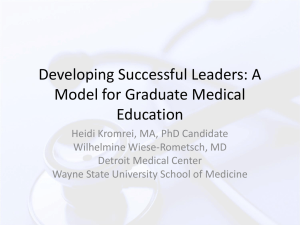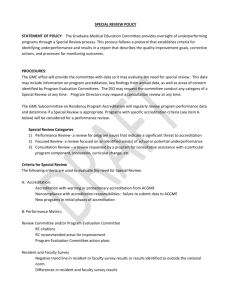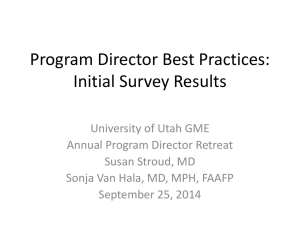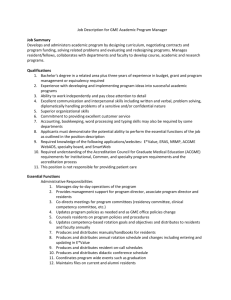Core Competencies for Institutional GME Leaders/DIOs
advertisement
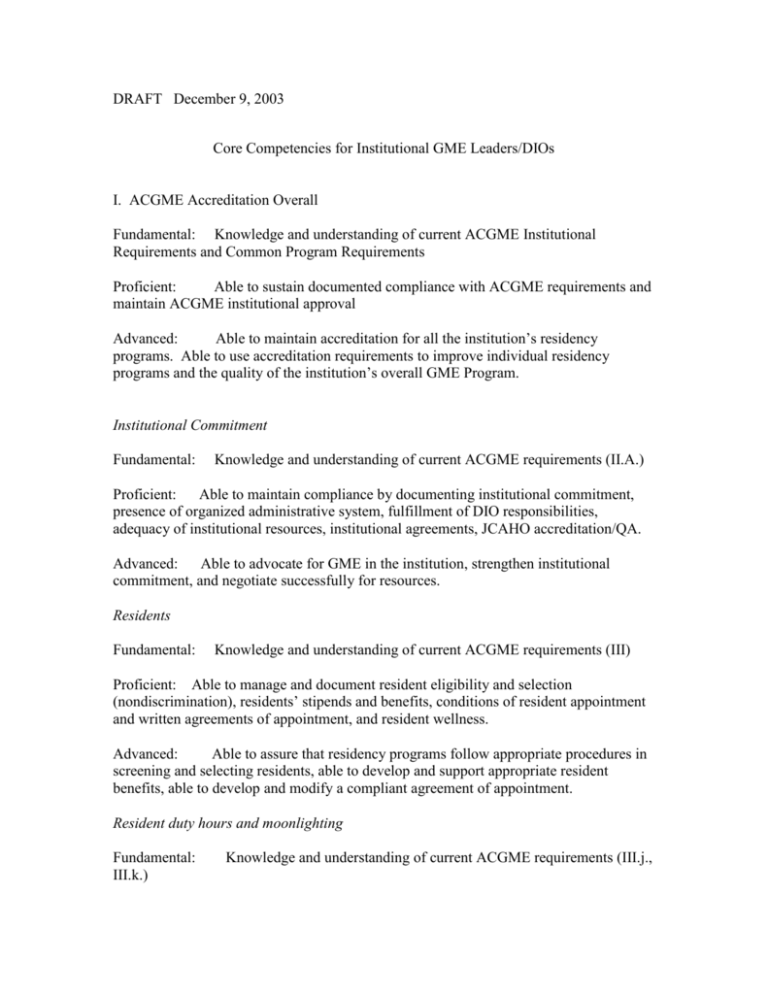
DRAFT December 9, 2003 Core Competencies for Institutional GME Leaders/DIOs I. ACGME Accreditation Overall Fundamental: Knowledge and understanding of current ACGME Institutional Requirements and Common Program Requirements Proficient: Able to sustain documented compliance with ACGME requirements and maintain ACGME institutional approval Advanced: Able to maintain accreditation for all the institution’s residency programs. Able to use accreditation requirements to improve individual residency programs and the quality of the institution’s overall GME Program. Institutional Commitment Fundamental: Knowledge and understanding of current ACGME requirements (II.A.) Proficient: Able to maintain compliance by documenting institutional commitment, presence of organized administrative system, fulfillment of DIO responsibilities, adequacy of institutional resources, institutional agreements, JCAHO accreditation/QA. Advanced: Able to advocate for GME in the institution, strengthen institutional commitment, and negotiate successfully for resources. Residents Fundamental: Knowledge and understanding of current ACGME requirements (III) Proficient: Able to manage and document resident eligibility and selection (nondiscrimination), residents’ stipends and benefits, conditions of resident appointment and written agreements of appointment, and resident wellness. Advanced: Able to assure that residency programs follow appropriate procedures in screening and selecting residents, able to develop and support appropriate resident benefits, able to develop and modify a compliant agreement of appointment. Resident duty hours and moonlighting Fundamental: III.k.) Knowledge and understanding of current ACGME requirements (III.j., Proficient: Able to develop sound policies and procedures governing resident duty hours and moonlighting. Advanced: Able to oversee the monitoring of resident duty hours; communicate ACGME requirements and institutional policies to residents, faculty, and program directors. Able to ensure compliance with duty hours requirements by all accredited programs. Able to oversee monitoring of resident moonlighting and compliance with ACGME requirements and institutional policies. Able to exercise leadership in achieving cultural change in support of limits on resident duty hours. Educational Program Fundamental: Knowledge of general competencies and requirements for education, outcome assessment, and improvement. Knowledge of requirements with respect to resident evaluations of faculty and their educational experiences. Proficient: Able to assist program directors in developing curricula and assessment methods in the general competencies. Able to identify, develop or assist others in developing tools for obtaining resident input about faculty and education. Advanced: Able to lead the institution in understanding the core competencies and their relationship to the continued professional development of physicians. Resident Work Environment Fundamental: Knowledge of requirements for an environment in which residents can discuss resident issues and individual residents’ issues can be addressed confidentially. Knowledge of requirements for services and support systems to minimize resident work that is of marginal or no educational value. Proficient: Able to develop and sustain processes that assure residents are able to communicate about their concerns and that allow resident problems to be addressed confidentially. Able to work with hospitals and other resident clinical sites to achieve adequate food, resident call rooms, and patient care support services. Advanced: Able to create an environment in which residents feel safe to discuss issues and problems. Able to help program directors identify instances of inadequate patient support services and find ways to improve the educational value of residents’ clinical experiences. GME Committee (GMEC) Fundamental: Knowledge of requirements for GMEC structure and key responsibilities. Proficient: Able to meet ACGME requirements, working effectively with GMEC to establish policies, oversee program directors, monitor program accreditation, and approve submissions to ACGME. Advanced: Able to exercise leadership and provide guidance to the GMEC; maintain the energy and effectiveness of the committee by making it interesting enough to engage key participants. Make the committee an effective force for program improvement. Internal Review Fundamental: Knowledge and understanding of requirements for conduct of internal program reviews by GMEC and their provision to the institutional site visitor during institutional review. Proficient: Able to meet ACGME requirements, documenting the internal review committee, its review protocol, the timing of the review, the materials used in the review, the review process including interviews conducted, and the review report. Advanced: Able to enhance the value of the internal review process in program improvement and as an educational/professional development activity for program directors. II. Institutional environment Fundamental: Knowledge of key people in the institution and its GME participating institutions/clinical sites. Proficient: Able to understand the goals and dynamic interactions among the key people in the institution and its GME participating institutions/clinical sites. Advanced: Able to work persuasively and effectively with key people to further the improvement of GME within the institution. III. Greater medical education environment Fundamental: Knowledge and understanding of the roles of outside organizations such as AAMC, AHA, ABMS, CMSS, NRMP, ECFMG, FSMB, etc., vis-à-vis graduate medical education. Proficient: Able to access and understand current information about these organizations’ structures, policies, and activities. Advanced: Able to recognize the significance of the policies and actions of these organizations, appreciate how they can reinforce each other, and recognize when they can help strengthen institutional support for and improve the quality of GME. III. Health care/health policy environment Fundamental: Awareness of major issues and actors in GME financing, health care financing, health care workforce, patient safety, healthcare quality, immigration, information technology, etc. that intersect with and influence GME. Proficient: Able to identify such key agencies and private organizations as CMS, HRSA, AHRQ, IHI, IOM. Awareness of current developments gained from their web sites, AAMC web site, professional society and GRA meetings. Advanced: Able to discuss policy issues and understand their implications for GME. Able to contribute to policy discussions inside the institution and in professional organizations. Able to identify and make use of opportunities such as new funding streams for education, educational evaluation. IV. Other professional development resources Fundamental: Awareness of additional professional development opportunities offered by AAMC and others. Proficient: Able to identify one’s own professional development needs and alternatives for meeting those needs. Advanced: Able to pursue professional development as needed for specific career goals and responsibilities. Secure institutional funding and support for participation in professional development. V. Other competencies Management of GME Office; hiring, supervision, personnel evaluations Resident orientation New program director orientation and development Nonsucceeding resident – assist PDs with disciplinary process, identifying sources of assistance, writing evaluations and improvement plans. Knowledge of legal issues, institutional policies and procedures, and resources for residents with personal problems. Finance/budget. Knowledge of sources of support for GME from institution, departments, outside grants, etc. Ability to establish and justify GME budget and advocate for necessary budgetary support. Assessment/measuring impact. Knowledge of basic methods of applied research as used to assess educational and patient care interventions. Communications/media relations. Presentation skills, ability to “market” GME Program with institutional leadership, governing board, and the community. Ability to lead a meeting. Ability to interact with the media on issues such as resident duty hours and patient safety (e.g. adverse events involving residents).
